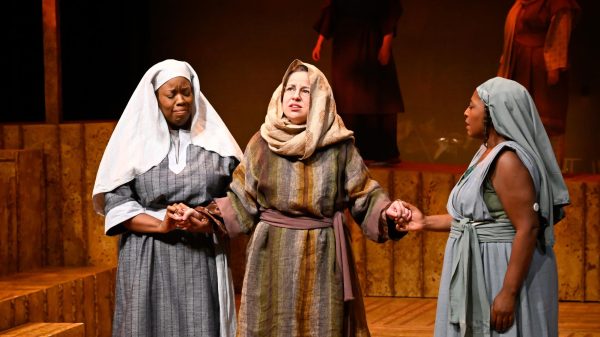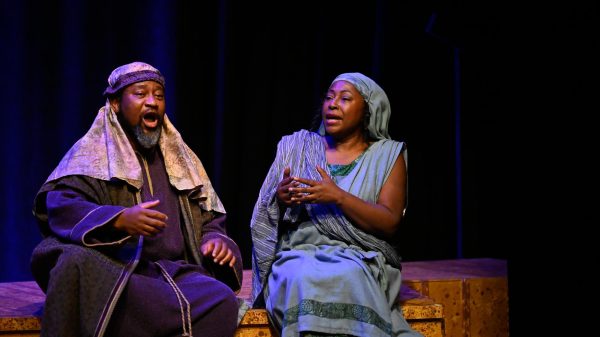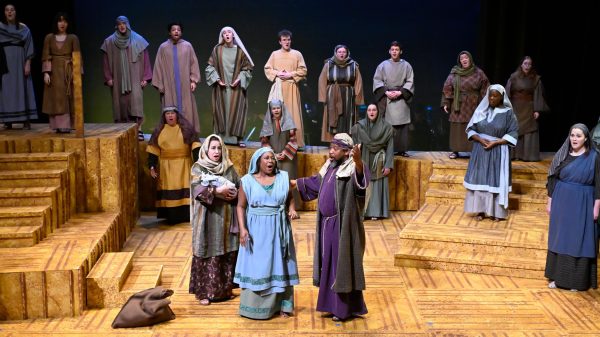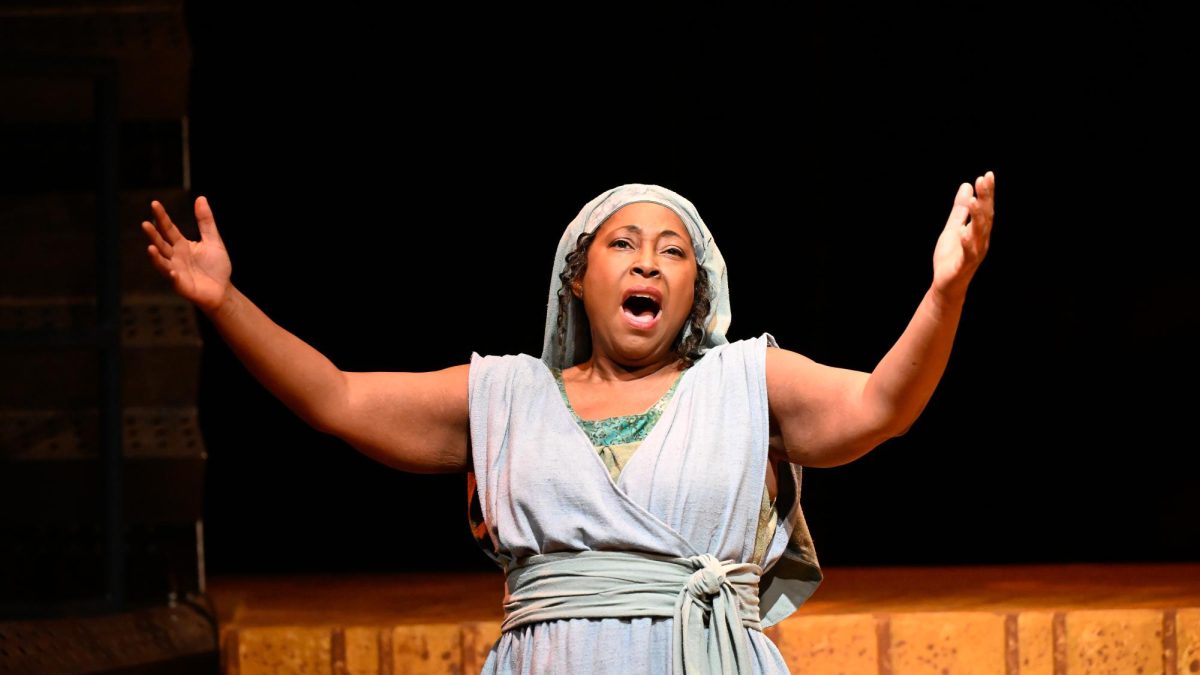“Ruth,” presented in the USI Performance Center Jan. 26 and Jan. 27, is a one-act opera put together by Philip H. Hagemann Performing Arts Department, Pegasus Opera Company, Evansville Philharmonic Orchestra and Chorus and USI Foundation. “Ruth” is the first opera the campus has hosted and has been staged several times in New York and in London.
The production is based on the “Book of Ruth,” from the Old Testament of the Bible, where Ruth, a Moabite woman, follows her mother-in-law, Naomi, to Judah after her husband, Naomi’s son, passes away. Through her marriage to Boaz of Bethlehem, she later became the great-grandmother of David, who became King of Israel.
When referencing the connection between Hagemann, Murray S. Rosenthal and Alison Buchanan before Saturday’s production began, Del Doughty, dean of the College of Liberal Arts, said there is a “special relationship at the heart of this evening’s performance.” I think this heart was evident throughout the evening.

The first half of the evening’s production was a performance of a collection of songs. I found this to be a unique but special way of opening the opera.
The first set of songs, “Yesterday is Poetry,” were created from poems by Emily Dickinson and music by Philip H. Hagemann.
“Papa above!” is a song that stuck out to me from this set because of its play on words. The two singers, Alison Buchanan and Kate Tombaugh, kept repeating “nibble” in various ways despite the lyrics only stating “nibble” once. I, and many audience members, chuckled and found this moment to be humorous.
Another song from the first set that stuck out to me was, “It’s all I have to bring today.” This song is memorable for me because it was a solo performance by Buchanan. Buchanan is a vocally talented and emotionally expressive singer and performer. I think her talents and effort were apparent in this song and others throughout the evening.

“Yesterday is History” is another song that impressed me. In this song, there were many great piano moments, which I found to be enjoyable. Also, there was a moment at the end of this song where all of the performers rounded together, which made for another great and enjoyable moment.
“To see her is a picture” was another song I enjoyed from the set. This song was performed by Tombaugh, and her voice reminded me of a Disney princess. This made me feel nostalgic during her performance, which I think is a great feeling for a song to produce.
I also found it impressive how these singers were still managing to act emotionally with their faces and body language while hitting difficult notes and working to harmonize constantly.
The second set of the collection of songs, “Four Poems of Langston Hughes,” was created from poems by Langston Hughes and music by Philip H. Hagemann.

“My People” is a song I especially enjoyed from this set because of its great musical quality. I think the music of this song sounded light but built in an intense way to where the music overtook the song.
“Lullaby (for a Black Mother)” was a song that stuck out to me during this set. In this song, Buchanan harmonized with the high sound of the violin, which I found to be impressive and showed immense skill. This song was also emotionally intense and charged because of the content and Buchanan’s performance. The song’s lyrics express the great love of a mother for her baby, and I could hear this emotion in Buchanan’s voice and see it in her body language and facial expressions.
The opera part of the evening opened with music performed by the Evansville Philharmonic Orchestra. The orchestra sat behind the stage area but could be seen through a see-through curtain. I’ve heard the Evansville Philharmonic Orchestra play several times and was again impressed by their talents and skills.
The stage setup and costumes for this opera were simple, and there weren’t many props. However, I think these aspects were fitting and accurate for this biblically inspired production. These simple aspects let the audience truly pay attention to and appreciate the singing and the acting of the opera.

The plot begins with Naomi’s (Kate Tombaugh) husband and her sons dying, or as stated in the opera, being taken away by the Lord. This meant Ruth (Alison Buchanan) and Orpah (Brenda Marie Turner), had lost their husbands and their father-in-law. To display this loss, these women and three other women sang “Sad is the Lot of Women.”
At this point in the production, I was again impressed with the emotion Tombaugh displayed while singing vocally challenging pieces of music.
Ruth, Naomi’s daughter-in-law, then pledges to stay with Naomi and travel with her back to Judah. Ruth makes this pledge by performing a solo, “Your God Shall Be My God.”
When they arrive in Judah, Ruth begins working in fields owned by Boaz (Chikezie Chike-Michael), kin of Naomi. Boaz shows favor to Ruth, and because Naomi’s nearest kinsman does not want to marry Ruth, Boaz marries Ruth, and they have a son named Obed.

I think this story and this opera’s portrayal of it is a testament to overcoming great adversity and moving forward. I also appreciate how accurately this opera followed the biblical story.
The opera ended with the entirety of the cast, including members of the USI chamber choir, singing a reprise of “Your God Shall Be My God.” I think this reprise was a strong end to this story, but it also almost felt like the beginning of another story, which I found unique and interesting for the ending of a production, but likely to be the point.
I had a good experience at this opera, as I found it to be unique, interesting and a production that showcased significant talent and skill. Before seeing Ruth, I had only been to one other opera before. I don’t remember too much about it, but I do remember it was loud, was in a language I didn’t know and had a vivid stage, storyline, costumes and props. This opera was the opposite in that it was not very loud and had a simple storyline, costumes and props.
However, this opera’s simplicity didn’t take away from its strong portrayal of emotion and strong message of overcoming difficult times and moving forward. I think its simplicity helped emphasize the emotions and message and made the audience truly pay attention to the storyline, the characters and their performances.




